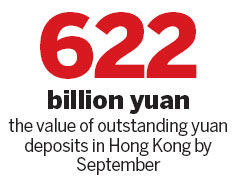Fears from offshore yuan use overblown
Updated: 2011-12-13 10:06
By Li Xiang (China Daily)
|
|||||||||||
BEIJING - The quickly increasing overseas demand for yuan will have little effect on the Chinese mainland's financial industry because of the modest amount of the currency that is in circulation overseas and the government's control of it, analysts said on Monday.
|
 |
The analysts were responding to a report that said the increasing offshore use of the yuan could undermine China's financial development.
On Sunday, the Bank for International Settlements said developments in the offshore use of the yuan could pose difficulties to the financial industry in the Chinese mainland. The largest reason for their worries: Many domestic companies are now trying to sell yuan-denominated bonds overseas, where interest costs are usually lower.
The practice could undermine domestic controls of the bond market and accelerate large Chinese firms' exit from the mainland banking system, the bank said. It could also complicate the country's monetary and credit policy, it added.
"The effect is likely to be small at the moment because of the relatively small amount of yuan in circulation overseas, which is valued at about 500 billion to 600 billion yuan ($79 billion to $95 billion)," said Guo Tianyong, director of the Central University of Finance and Economics' research center of the Chinese banking industry.
By August, the value of yuan deposits in Hong Kong had been equivalent to 0.8 percent of the value of yuan deposits on the mainland, according to JPMorgan Chase & Co.
Guo said the increased offshore use of the yuan could help to open up financial markets on the Chinese mainland and force State-owned banks, if they want to retain clients, to have a strong presence overseas.
In recent years, China has worked to spread the use of its currency in the world. Hong Kong is now seen as becoming an important place for the offshore use of the yuan. Beijing has also pledged to allow overseas companies to spend the currency on direct investments in the mainland.
By September, the value of outstanding yuan deposits in Hong Kong had increased sharply to 622.2 billion yuan, making up 10.4 percent of Hong Kong's total bank deposits, according to the Hong Kong Monetary Authority.
The demand for offshore yuan-denominated bonds increased quickly after the Chinese central bank loosened its regulations to allow Chinese companies to sell those bonds directly in offshore markets.
Related Stories
Detailed regulations on joining SDR expected 2011-10-29 11:44
US House Speaker reiterates opposition to China currency bill 2011-10-26 08:05
Dialogue 'best way' to avoid trade war 2011-10-26 07:40
Time for China to dump US debt? 2011-10-20 06:50
Pressuring yuan misguided 2011-10-18 15:48
Pressuring yuan misguided 2011-10-18 08:02
- MOC conditionally OKs Seagate-Samsung HDD deal
- Industries to remain world's most competitive
- Watsons to open 2,000 stores in five years
- Fears from offshore yuan use overblown
- China's slice of export pie may shrink
- Banks pushing to maximize lending
- US bill proposes visas for realty
- Beijing plans cloud computing center








